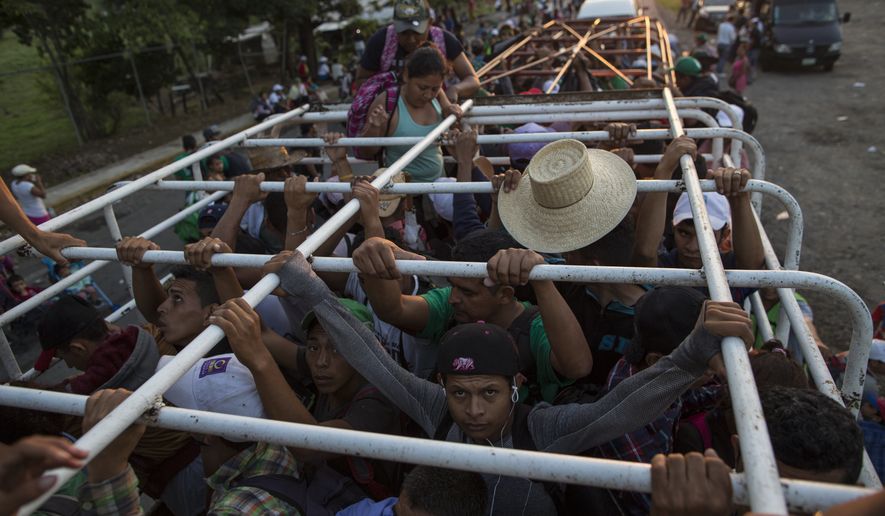A federal court of appeals ruling this month provides a peek at the U.S.’s generous asylum system that will have the effect of welcoming the impending instant mass migration from Central America.
Some migrants among the caravan, due to arrive at the southern border within weeks, have told reporters they plan to capitalize on the years-long process to try to gain legal status.
The court case involved Venezuelan Helegner Ramon Tijera Moreno. He deserted the army, came to America and sought asylum by declaring himself persecuted by Caracas’ authoritarian socialist government.
Two years later, he was before the 10th Circuit in Denver––a member of the second highest network of federal appeals courts below the Supreme Court. A three-judge panel on Oct. 22 denied Mr. Moreno’s petition. He cannot stay legally.
The ruling provides a look at the long due process the U.S. provides each asylum seeker who merely has to step onto American soil and make the declaration to put off deportation. The court opinion also includes Mr. Moreno’s narrative on life inside a once-prosperous country now beset by economic turmoil, food shortages, crime, and a crackdown on dissent.
It is easier to claim asylum than to ultimately prove a person deserves it
DOCUMENT: 10th Circuit ruling in Moreno v. Sessions
To ask for asylum via the online form No I-589, the person files inside the United States no matter how entry was gained––legally or illegally.
As the U.S. Citizenship and Immigration Services states, “To obtain asylum through the affirmative asylum process you must be physically present in the United States. You may apply for asylum status regardless of how you arrived in the United States or your current immigration status.”
Federal law sets a high adjudication bar. The law says an alien must demonstrate he is a refugee “who is unable or unwilling to return to ….. that country because of persecution or a well-founded fear of persecution on account of … race, religion, nationality, membership in a particular social group or political option.”
To start the process, Mr. Moreno in 2016 first received a “credible-fear” interview by customs officials who determined he lacked valid entry documents and planned to deport him. He stopped the process by then applying for asylum and protection under the Convention Against Torture, ensuring he could not be removed.
His next stop was before an immigration judge who denied his petition and ordered him deported.
His third step was the Board of Immigration Appeals.
“The BIA agreed with the [judge’s] conclusion that Mr. Moreno failed to show he suffered past persecution,” the 10th circuit opinion said.
America’s immigration courts are busy places. The Center for Immigration Studies reported in May that there were 697,777 pending cases before immigration judges or about 2,090 per judge. In 2017, about 170,000 cases were completed. Of those, 9,840 were asylum proceedings, such as Mr. Moreno’s, of which one-third were denied. Thus, the odds are an appliance will win legal status.
Here is Mr. Moreno’s story of persecution.
In April 2013, while an officer in the Venezuelan army, he was assigned as part of a security detail at a presidential election polling place. Henrique Capriles Radonski, the candidate running against the incumbent government of acting president Nicolas Maduro carried the precinct.
Overall, Mr. Maduro won the presidency, succeeding the late socialist Hugo Chavez.
But Mr. Moreno’s commanding officer accused him of being a traitor due to the voting returns. As punishment, the polling place security detail was forced to stand at attention for four hours. The next day, they were summoned by the General Directorate of Military Counter-Intelligence.
A month later, Mr. Moreno received a second summons for questioning on his political views.
By July, he was on a joint patrol with local Caracas police. They arrested a group of youths wielding rifles and handguns. Two weeks later, the youths spotted him a family reunion. He was robbed and beaten, requiring surgery, he said.
A friend filed a police report which didn’t note any injuries
“He sought psychiatric treatment and was diagnosed with an impulse disorder,” the U.S. appeals court wrote. “By December 2014, Mr. Moreno had applied for and been denied retirement from the army five times. Facing consistent threats of imprisonment, Mr. Moreno deserted the army and fled Venezuela.”
The court concluded that Mr. Moreno’s story “does not compel a finding of persecution.”
Said the opinion, “Mr. Moreno was forced to stand at attention for long periods of time as a matter of military discipline, apparently because he believed he was perceived as being disloyal to the governing regime and insubordinate for refusing to recite a political motto, but he was never physically mistreated. He was also transferred to a different unit in Caracas, which he describes as a “gang-infested territory …. but military discipline and station assignments generally fail to evidence persecution.”
Mr. Moreno claimed he was indigent and lacked the money to pay a filing fee.
U.S. Customs didn’t reply to a Washington Times inquiry on Mr. Moreno’s current status.
Some asylum seekers slip through the cracks and stay in America illegally.
• Rowan Scarborough can be reached at rscarborough@washingtontimes.com.




Please read our comment policy before commenting.